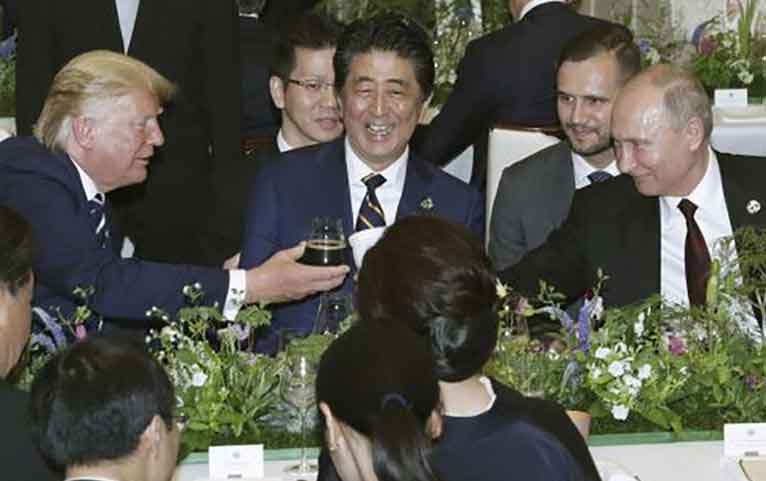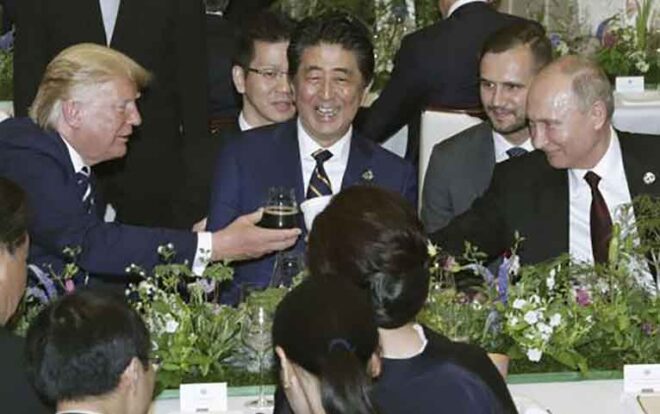



I was surprised, as I’m sure you all were, too. Today’s news is that former Prime Minister Shinzo Abe was shot and killed. My colleague, who was watching the news on his phone during a break at work, even told me out loud. I thought he had seen a common internet hoax until I checked the media article myself. I would like to take this opportunity to express my sincere condolences to the next of kin.
[Sponsor Ad]
According to current reports, he was shot from behind with what appeared to be a shotgun while he was giving a speech in support of the Upper House election in Nara Prefecture. The murder weapon was probably a handgun made by the perpetrator, who is said to be a former military man, but not many details are known at this time. In any case, it is not a good idea to speculate from fragmentary reports.
Such terror against those in power or dissidents in the field has changed over time and in different places. In the traditional leftist camp, Lenin’s revolutionary theory has a history of clearly criticizing and rejecting “terror tactics. On the other hand, in the feudal era, people talked about “assassins”, “heroes”, and “tenchu” as if they were heroic romantics, and in postwar history, right-wing camps have taken over such ideas, causing the famous stabbing murders of Inajiro Asanuma and the attack on Nobusuke Kishi, among others.
However, the motive for the attack is still unclear, as there are reports that the perpetrator said in his statement after his arrest that he was not dissatisfied with Abe’s political assertions and that he intended to kill a certain religious leader who was not even there, among other things.
What I feel when I hear such reports is a distorted sentiment that it is okay to attack those who are different from oneself, or to blame others for the despair of society, which is different from “conventional terrorism” in Japan. I sense a hatred that is common to the shootings in the United States. It first arose from the Internet, gained strength within the Internet, and then racism took it to the streets, and before long it became a “common” scene. It was tolerated in Japanese society, ignoring the pain of hurt minorities. The death of Mr. Abe seems to be the end of such a trend.
Anyway, I really did not want Abe to die. Now, all the numerous allegations he was being pursued for will probably be covered up with “condolences” and “criticism of violence” and “tributes to the deceased”. This, along with the continuation of “ideology-driven politics that does not (or cannot) discuss issues,” is bound to corrupt democracy.
Chief among them, I think, is the issue of Russia’s invasion of Ukraine, where in 2016 he called himself “Abe of diplomacy” and invited Putin, who had been internationally isolated after his 2014 military intervention on Ukrainian territory and annexation of Crimea, to Japan, offering him a helping hand with economic cooperation and even saying, “Vladimir, we He even said, “Vladimir, we see the same future. Again, this was after the first invasion of Ukraine (annexation of Crimea). Also, the massacres of civilians and rapes that we now criticize, including by the Japanese government, were taking place in the Chechen conflict on a scale that exceeded that of Ukraine.
People belonging to the Network Against Japan Arms Trade (NAJAT), who had already been criticizing Putin from this point on, tried to hold a protest in front of the prime minister’s residence to protest even a word against this ugly Japan-Russia collusion. They were then locked in as police officers closed and locked the shutters of the subway that was open for business. This was the Abe administration’s attempt to protect the “welcome Putin” mood. Usually, various actions take place peacefully in front of the Prime Minister’s Office. This can only be described as an overreach by the police officers.
He called himself “the Abe of diplomacy” and pretended that he was Putin’s equal. He probably had an ambition to “leave his name in the history books” by extracting from Putin the return of two of the so-called four northern islands lost during World War II. However, Putin took advantage of Abe and Abe ended up only promising economic support.
In fact, the theory of the return of the two islands was a concept that was supposed to have been beaten up by Mr. Muneo Suzuki for corruption during the Koizumi administration and treated as a “national pirate” and a “traitor. I recall that then-Prime Minister Koizumi even said, “I don’t want to believe that any Japanese politician (whether from the ruling or opposition party) would say such a thing,” but if Abe says the same thing, it must not be true.
However, when Prime Minister Abe resigned as prime minister, the invasion of Ukraine began in earnest, and the U.S. took the lead against Russia, he began to blurt out “memories of President Zelensky,” as if to say, “I have been a friend of Ukraine for a long time.
When asked to address his close friend Putin, he did not respond, but instead said, “In order for Japan not to become like Ukraine, we need to arm ourselves with nuclear weapons (nuclear sharing), double our military budget, and revise our Constitution.
| ロシアのプーチン大統領を説得できる政治家はいないのだろうか。国内では27回の首脳会談を重ねた安倍晋三元首相を特使に推す声がある。ジャーナリストの鮫島浩さんは「むしろ安倍氏は今回のウクライナ危機を受け、日本国内に米国の核兵器を配備する『核共有』の検討を提案している。安倍氏にはプーチン氏を説得しようという気はないようだ」という――。 プーチンと27回も会談したのに…この重大局面でまったく役に立たない「安倍外交」とは... - PRESIDENT Online(プレジデントオンライン) |
Originally, Mr. Abe was a man who would say anything at the right time to increase his approval ratings and realize his ideology. In the early years of his second administration, he would “promise!” in rapid succession, most of which did not materialize. I knew it, but it is indeed nauseating to see how far he has come. Shinzo Abe should be ashamed of himself! I wish he would live to explain himself. I wish he had lived to make an explanation for that, too.
I was convinced that if left to these people, Japan would not become “like Ukraine” in the future, but “like Russia. Indeed, as of 2016, I believe that the two nationalists, Abe and Putin, were “looking at the same future”.
The scumbags who try to use everything for their own ideology, including Mr. Abe’s death, will surely say “don’t whip the dead” when I write this (sneer). Let’s just say that cold-blooded scum who try to use people’s deaths for political purposes have no right to say “against violence” or anything like that.
No one wanted him dead. No one in this world deserves to die. There is only the feeling of ordinary people that they should be sensible and take responsibility.
Or that the Abe administration’s outrages, such as the War Law (right of collective self-defense), the Secret Protection Law, and the collusion crime, transformed Japan into a “country capable of war,” built a military system in collusion with the US military at the expense of Okinawa, and attempted to enact the Abe Constitution as the finishing touch to this transformation. He should have witnessed the results and taken responsibility.。
This is not the feudal era. History is not changed by the terrorism of dignitaries itself. What the Abe administration has done is part of the flow of history, which includes the left (and its disappointment) from before that time, and is one “inevitability,” if I may put it that way without fear of misunderstanding. In the history of Japan, much less in the history of mankind, his existence is just one small cog in the wheel. As for the Abe administration’s attempts to change the shape of the country based on ideology, nothing will change even if Mr. Abe himself disappears.
Whether or not the future will bring us to the disastrous end of the “Abe era was the turning point” depends entirely on the decisions of all of us in Japanese society.
In terms of campaign realism, Abe’s death will work to the advantage of the LDP. It could result in a larger-than-expected victory. It will also lead to more intensified repression (of state power and right-wingers) of anti-war peace, such as the anti-war movement in Ukraine. In fact, as of today, ruthless incitement of racism and xenophobia has already begun on the Internet, taking over Abe’s “anything goes” policy, using human death as a means of incitement, such as “Abe was politically assassinated” and “foreign powers such as China and Korea are behind this”.
For now, the powers that be can’t say, “War is an option. They can only say, “We don’t want war either. The U.S., as the parent of the Japanese government, will not suddenly demand something so blatant that it could put the Japanese government in a difficult position at once. It is being careful to that extent. But it all depends on our level of anti-war awareness. They will try to erode our anti-war consciousness little by little, even using the situation in Ukraine and Abe’s death to their advantage. Let us be even more vigilant now.
Let me repeat this one last time. There is not a single person in this world who deserves to die, should die, or should be sacrificed.